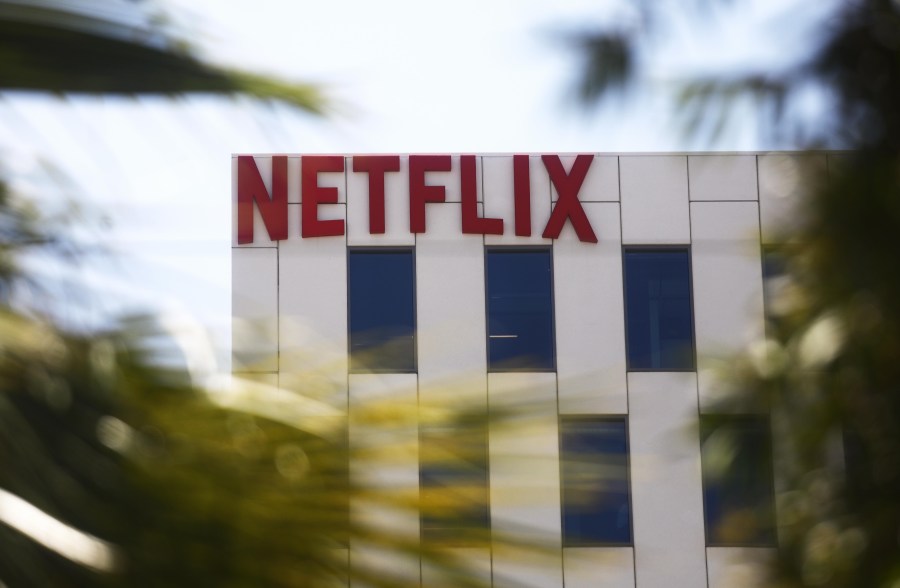How will Netflix’s new ad-supported tier shake up the streaming landscape?

Starting today, Netflix users in the United States will have the option to sign up for a cheaper subscription. But, of course, there’s a catch.
If you want to pay $6.99 a month, rather than $9.99 a month or more, your TV and movie binge sessions will be interrupted by ads, which runs counter to the original premise of Netflix and many other streaming services: just content, no commercials. But now, that’s changing.
Marketplace’s Kimberly Adams spoke with Brandon Katz, an entertainment industry strategist at Parrot Analytics, who said Netflix needed to make this kind of move. The following is an edited transcript of their conversation.
Brandon Katz: When Netflix’s growth slowed, and actually they lost subscribers for the first time in 10 years as an original content provider earlier this year, well, no longer could they sell Wall Street on adding massive amounts of subscribers every single quarter. Instead, they’re trying to pivot and refocus their narrative to Wall Street around revenue, profit and free cash flow. So bringing in an ad-supported tier is expected to generate billions in revenue over the long term, and hopefully increase their total addressable market by making an ad-supported, cheaper option available to a wider array of potential customers.
Kimberly Adams: And how is this expected to roll out and get picked up in the U.S. versus the rest of the world?
Katz: Yeah, that’s a very interesting question, because they are going to have to figure out not only new licensing agreements with original content owners, but they’re going to have to be doing it market by market for where they are rolling out the ads here. And now, Netflix is going to start by rolling out in the UCan market — and that is the United States and Canada. So really, the domestic arena, which is their most important market, because it’s the most saturated and highly competitive of all the streaming markets, and it’s where they’ve actually been losing subscribers in recent quarters. And then [it] will slowly be launched in overseas markets over the next several months. So it is a very, very important and strategic rollout for Netflix. It’s not without a whole bundle of complications that makes this a high-wire act of balancing what they want from the upside perspective and what they need to do from a logistical, realistic perspective. So it’s going to be very interesting to watch this slow and steady process.
Adams: Netflix isn’t the only service introducing ads right about now. Disney+ is set to do it next month. What does this tell us about the overall streaming ecosystem?
Katz: It speaks volumes to the economics of streaming, which are not as beneficial and profitable as the traditional legacy linear model. And so now we are simply recreating that legacy paid-TV model via the internet. We’re likely not to see anything like Netflix’s early heyday ever again in entertainment.
Adams: Netflix is known for its very powerful recommendation algorithm. How will that work on the ad-supported tier?
Katz: It’s going to be really interesting to see the difference between ad-supported and ad-free, because I think that they’re going to probably have to roll out a siloed, top 10 carousel for the ad-supported market. I think with ad-supported tiers, also, you’re going to have to have a little bit of a reset, so your preferences from ad-free might not carry over as you switch plans.
Adams: For those people who still have cable, it’s such a targeted experience when it comes to advertising. It’s not just what city you live in. It can be what neighborhood you live in, or even what your cable company knows about you when it comes to what ads are being served up to you. How, in this case, do you think Netflix is going to navigate this type of ad targeting?
Katz: This is an important question, and I think it has repercussions for the entire industry. Number one, you have responsibilities. So Netflix has already announced that it won’t be including ads in kids-oriented programming, as that has been a massive problem and issue for YouTube over the years. And larger scales, we look at the entire streaming industry [and] you continue to see debates pop up on whether or not a streaming platform is going to include political ads or ads from alcohol companies. And then if they do, it goes to “OK, are we making sure that we’re targeting the right people or people that are 21 and over that can buy these products?” It becomes an entirely new battleground with which to navigate.
Now, Netflix has been an innovator and disrupter from Day One, and they’ve already promised to underindex the amount of ads per hour than its competition does. I also wouldn’t be surprised if Netflix further innovates and tries to look for new and interesting ways to deliver the ad experience to users. Now, they did partner with Microsoft for their ad tier, which was a bit of a surprise given how entrenched and established other companies such as a Comcast were in this field. But they also did that so they didn’t have any overlap with a competitor. Microsoft is not a streaming video on-demand content competitor of Netflix. So between the two of them and the kind of surprising left-field choices, we got to expect, based on company track record, that they are going to try to innovate and refresh the ad experience. Exactly how? Well, we gotta wait to see, but I’m excited to see what they come up with.
Adams: So as somebody who follows the space, what are some of the challenges you’ll be watching for now that Netflix is also going to have to answer to advertisers?
Katz: I’m really interested to see how this contributes to greater transparency of viewership and ratings within the streaming field. We’re obviously going to see Netflix have to hand over viewership stats to advertisers here in the U.S. market. And oftentimes, in these media conversations, those numbers can leak out to the public. So I’m very, very interested to see how this development contributes to more open-endedness in the streaming world, because as of now, it’s been extremely nebulous, extremely tight-lipped, and many creators and showrunners and producers have really no idea how many people are watching their shows, because the streamers such as Netflix are very selective with the data they convey to their own creative partners. So this could be the first domino in what is a very significant overhaul of the streaming transparency era.
Adams: Right, because that matters for those creators when they’re negotiating their deals.
Katz: Absolutely, because this has hurt the middle class of writers who are now forced to jump from job to job because streaming has really shortened television seasons for the most part, and are not equipped with the same data, insight and information that they once were through a linear Nielsen’s rating. And so they can’t argue for higher fees or more expanded benefits for their writers’ room. So this is a very, very, very pivotal potential moment in the industry, because it can hopefully balance the field in favor of the creatives who are trying to negotiate more for their wages, for their writers’ rooms, for their benefits, and it has become a lot more difficult in this fragmented, shortened-season television industry that we find ourselves in now.
The future of this podcast starts with you.
Every day, the “Marketplace Tech” team demystifies the digital economy with stories that explore more than just Big Tech. We’re committed to covering topics that matter to you and the world around us, diving deep into how technology intersects with climate change, inequity, and disinformation.
As part of a nonprofit newsroom, we’re counting on listeners like you to keep this public service paywall-free and available to all.
Support “Marketplace Tech” in any amount today and become a partner in our mission.


















